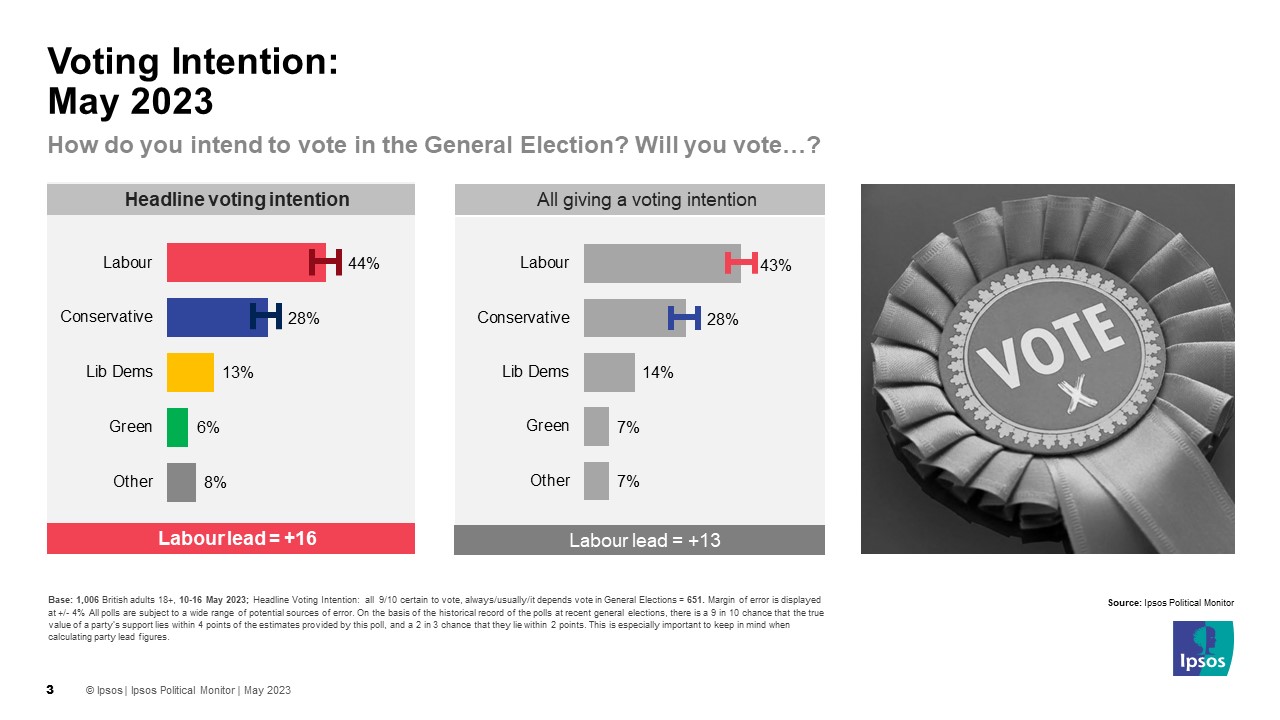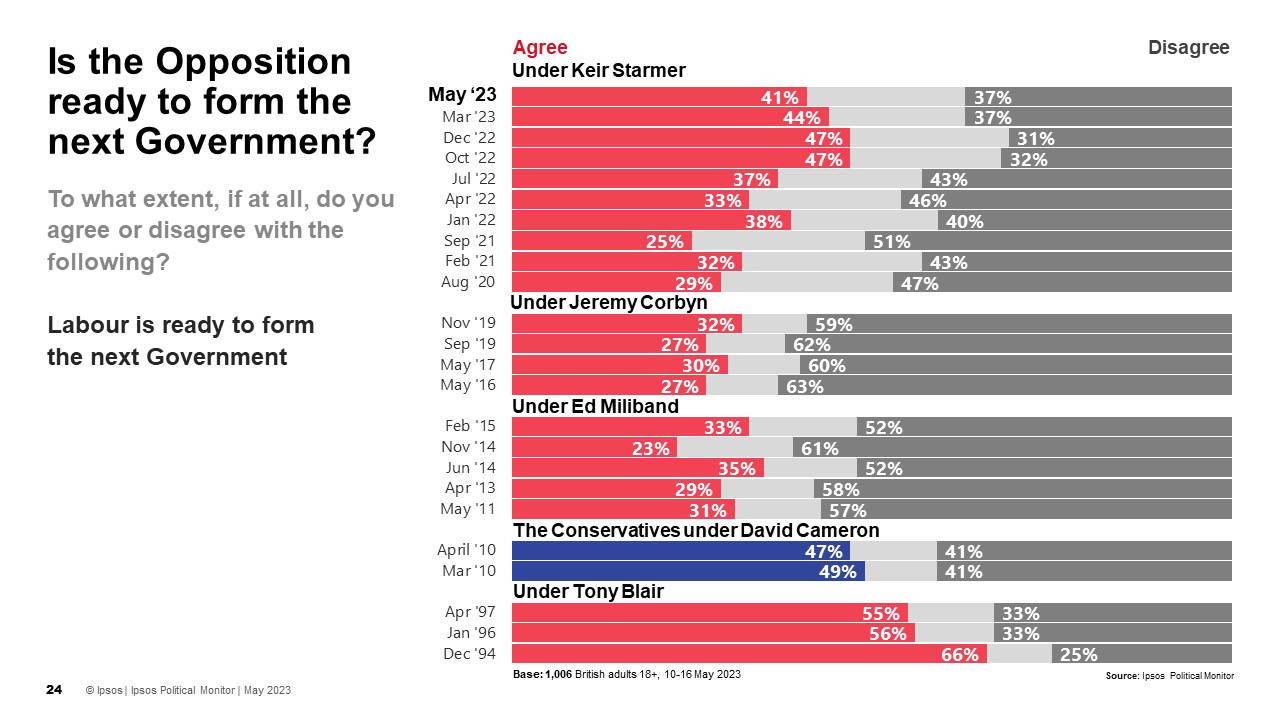Nearly 2 in 3 Britons expect Labour to win most MPs at next General Election
- 76% are dissatisfied with the way the government is running the country
- Keir Starmer and Rishi Sunak tied on most capable PM
The latest Ipsos Political Monitor, taken 10th to 16th May 2023, asks the public what they expect the outcome of the next General Election to be. It also explores satisfaction with the main party leaders and government and attitudes to the main parties; including whether the Conservatives deserve re-election and if Labour are ready for government.
Outcome of the next election
- 63% of Britons expect Labour to be the biggest party after the next General Election. This is made up of 43% who expect a hung parliament with Labour as the largest party and 20% who think Labour will win a majority.
- Just 25% expect a Conservative victory (8% expect a Conservative majority and 17% a hung parliament with the Conservatives as the largest party).
- In September 2019, just 23% expected a Labour victory at the coming election, and 58% a Conservative one (12% expected a Conservative majority, 46% expected a hung parliament with the Tories as the largest party).
UK Voting intention and government / leader ratings
Labour’s lead stands at 16 points – down from 23 points in March:
- Labour 44% (-5pts from March)
- Conservatives 28% (+2pts)
- Liberal Democrats 13% (+2)
- Greens 6% (nc)
- Other 8% (nc)

The government continues to be unpopular:
- 76% are dissatisfied with the way the government is running the country (-1 pt from March). 15% are satisfied (-1).
- 23% agree the Conservatives deserve to be re-elected (up from 19% in December). 56% disagree (down 5pts).
- 8 in 10 (80%) say ‘Britain needs a new team of leaders’. In March 2010, before Gordon Brown’s Labour lost the coming election, 76% held that view.
In terms of leader ratings:
- Rishi Sunak and Keir Starmer remain neck and neck on who would make the most capable PM. 34% choose Sunak and 33% choose Starmer. This picture is relatively unchanged since March, with both leaders slightly down.
- Satisfaction levels with each leader are similar. 30% are satisfied with the job Sunak is doing as PM (-2pts from March), 55% are dissatisfied (+1). Net = -25.
- 68% of Conservative voters are satisfied with the job Sunak is doing (-7pts from March) and 21% are dissatisfied (+6pts).
- For Keir Starmer, 31% are satisfied with the job he is doing as Labour leader (unchanged from March) and 50% are dissatisfied (-1).
- Half (50%) of Labour voters are satisfied with the job Starmer is doing (+2 pts from March) and 36% are dissatisfied (-9pts).
- 36% think Keir Starmer is ready to be Prime Minister (-3 on March) and 40% disagree (unchanged).
- Ed Davey’s ratings as Lib Dem leader have improved following his party’s successes at the local elections. 25% are satisfied with the job he is doing (+5) and 32% are dissatisfied (-4). However 42% still say they don’t know.
Is Labour ready to form the next government?
- 41% think Labour is ready to form the next government (-3 from March) and 37% disagree (no change).
- One in three (33%) do not think Labour has the knowledge to run the economy properly, but 43% disagree. In March 2010, 37% had doubts about the Conservatives on the economy, but 50% disagreed.

Economic optimism
24% of Britons expect the economy to improve in the next 12 months (+2 pts from March) and 54% think it will worsen (-4). This amounts to a net Economic Optimism Index of -30. This is slightly up from -36 in March and considerably up from the turn of the year, when it was as low as -55 in December – although still worse than the long-term average.
Gideon Skinner, Head of Political Research at Ipsos, said:
Keir Starmer’s Labour is in a very different position to 2019, with most Britons now expecting that they will emerge the biggest party at the next election, and having overcome quite a lot of the doubts about them. The next step is whether they can turn that into stronger levels of enthusiasm for a Labour government with a clear majority, while as leader there is still little to choose between public perceptions of him and Rishi Sunak.
The Conservatives, though, face even bigger challenges, with widespread dissatisfaction with the government, much lower than the average over the last 40 years, and reminiscent of the figures John Major and Gordon Brown were getting in their last full year in office. Economic optimism is also in relatively short supply – though there are some signs here at least that it is improving slightly after last year’s lows. So while Rishi Sunak does show signs of steadying the ship he will want to deliver better news on the economy and other public priorities to persuade more people that the Conservatives deserve to be re-elected.
Technical Note
Ipsos interviewed a representative sample of 1,006 adults aged 18+ across Great Britain. Interviews were conducted by telephone between the 10th to 16th May 2023. Data are weighted to match the profile of the population. All polls are subject to a wide range of potential sources of error.
On the basis of the historical record of the polls at recent general elections, there is a 9 in 10 chance that the true value of a party’s support lies within 4 points of the estimates provided by this poll, and a 2 in 3 chance that they lie within 2 points. This is especially important to keep in mind when calculating party lead figures.






